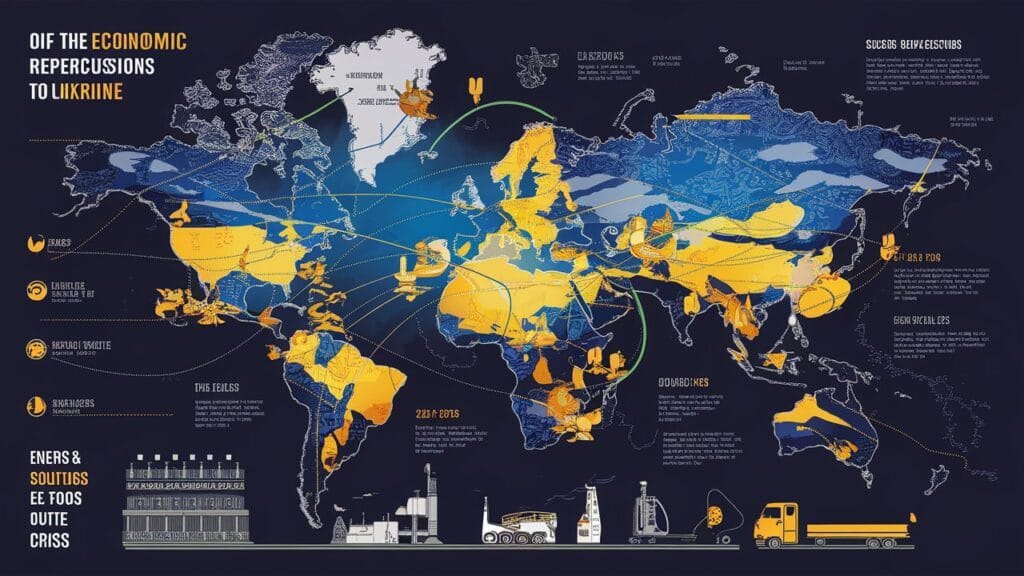Introduction
Russia’s invasion of Ukraine has triggered a humanitarian crisis and ignited a conflict with severe global repercussions. The war has unleashed a shockwave through the world’s economic systems, disrupting supply chains, driving up energy prices, and threatening food security. This article explores the multifaceted economic impact of the Ukraine war, its far-reaching consequences, and the uncertainties it poses for the future.
Historical Background
The roots of the current conflict trace back to complex historical, political, and economic factors. Understanding this backdrop is essential to grasp the gravity of the situation and its broader implications.
- Post-Soviet Era: The dissolution of the Soviet Union in 1991 left Ukraine as an independent nation with a complex relationship with Russia. Economic ties remained strong, particularly in the energy sector, but political tensions simmered.
- Euromaidan Revolution: In 2014, pro-European protests in Ukraine led to the ousting of the pro-Russian president, Viktor Yanukovych. Russia responded by annexing Crimea and supporting separatists in eastern Ukraine, sparking a conflict that continues to this day.
- Economic Interdependence: Despite the conflict, Ukraine and Russia remained deeply intertwined economically. Ukraine is a major transit country for Russian gas exports to Europe, and both countries are significant exporters of grain and other commodities.
Key Components of the Economic Impact
The Ukraine war has disrupted three key pillars of the global economy:
- Supply Chain Disruption: Ukraine and Russia are major suppliers of raw materials like wheat, corn, sunflower oil, neon gas (used in semiconductor production), and metals like palladium and nickel. The war has disrupted the flow of these goods, causing shortages and driving up prices worldwide.
- Energy Crisis: Russia is a major energy exporter, particularly of natural gas. The war and subsequent sanctions have severely curtailed Russian energy exports to Europe, triggering a dramatic rise in energy prices and concerns about energy security.
- Food Insecurity: Ukraine, often referred to as the “breadbasket of Europe,” is a leading exporter of wheat, corn, and barley. The war has halted agricultural production and exports, exacerbating existing food shortages in vulnerable regions and contributing to global inflation.
Multifaceted Perspectives on the Economic Impact
- Economists: Experts warn of a prolonged period of high inflation and economic uncertainty. The war’s impact is amplified by existing supply chain bottlenecks and the lingering effects of the COVID-19 pandemic.
- Governments: Many countries are scrambling to secure alternative sources of energy and food. Governments are also grappling with the rising cost of living and the potential for social unrest.
- Businesses: Companies are facing higher costs for raw materials and energy, forcing them to raise prices or absorb losses. Disrupted supply chains are also causing production delays and shortages.
Impact and Implications
The economic fallout of the Ukraine war is far-reaching and complex:
- Inflation: Soaring energy and food prices are driving up inflation rates worldwide, eroding purchasing power and hurting consumers.
- Economic Slowdown: Higher costs and supply chain disruptions are hindering economic growth, particularly in Europe.
- Social Unrest: Rising food and energy prices are sparking protests and unrest in many countries, particularly those that rely heavily on imports from Ukraine and Russia.
- Geopolitical Shifts: The war is reshaping geopolitical alliances and trade relationships, with countries seeking to reduce their dependence on Russian energy and diversify their supply chains.
Current Developments and Future Outlook
As the war in Ukraine continues, the economic outlook remains uncertain. Recent developments include:
- Energy diversification: European countries are accelerating their shift towards renewable energy sources and seeking alternative gas suppliers.
- Food security initiatives: International organizations and governments are working to address food shortages and stabilize global markets.
- Sanctions: Economic sanctions against Russia are having a significant impact on its economy and global trade.
The future of the global economy depends on the duration and intensity of the conflict, the effectiveness of mitigation measures, and the ability of countries to adapt to a new economic landscape.
Frequently Asked Questions (FAQs)
- How long will the economic impact of the Ukraine war last? The duration of the economic fallout depends on many factors, including the length of the conflict, the effectiveness of sanctions, and the ability of countries to find alternative sources of energy and food.
- Which countries are most affected by the economic impact of the war? Countries that rely heavily on imports of energy and food from Russia and Ukraine are the most vulnerable. This includes many European and developing nations.
- What can be done to mitigate the economic impact of the war? Measures to mitigate the impact include diversifying energy sources, securing alternative supply chains, providing targeted support to vulnerable populations, and promoting international cooperation to stabilize markets.
Conclusion
The economic impact of the Ukraine war is a stark reminder of the interconnectedness of the global economy and the fragility of supply chains. As the conflict continues, the world faces a period of prolonged economic uncertainty and volatility. However, by understanding the complex economic dynamics at play and implementing effective mitigation strategies, it is possible to navigate this crisis and build a more resilient and sustainable global economy.

Sunil Garnayak is an expert in Indian news with extensive knowledge of the nation’s political, social, and economic landscape and international relations. With years of experience in journalism, Sunil delivers in-depth analysis and accurate reporting that keeps readers informed about the latest developments in India. His commitment to factual accuracy and nuanced storytelling ensures that his articles provide valuable insights into the country’s most pressing issues.



